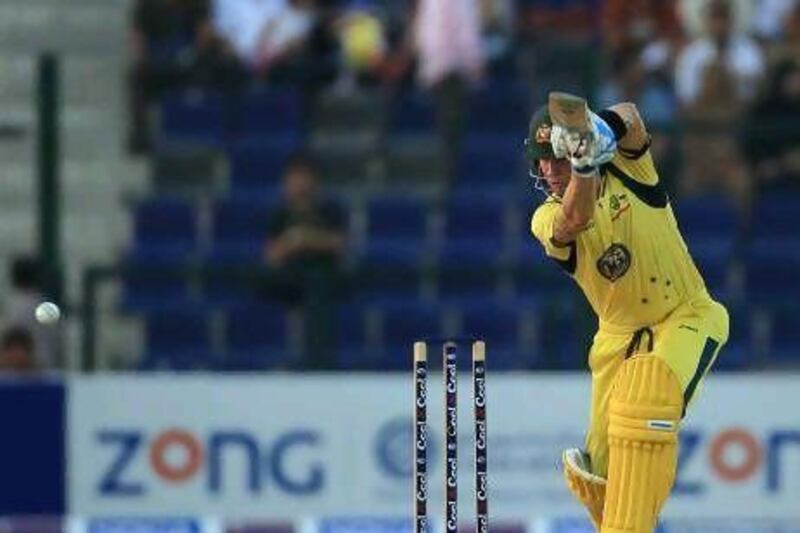Of Australia, and in particular of the sides that dominated the game through the start of this century, a couple of images can be mined when discussion turns to the few, little dents in their formidable armours.
Both involve Sri Lanka but are not restricted to them.
The first is from the 2002 Champions Trophy semi-final, where five Sri Lankan spinners of varying threat and utility, came together as one giant python and gradually and deliberately squeezed the life out of an innings that had begun smoking hot.
Adam Gilchrist and Matthew Hayden had put on 49 in just under seven overs, but Kumara Dharmasena, Muttiah Muralitharan, Aravinda de Silva and Upul Chandana restricted them to just 113 more runs in a little over 40 overs thereafter; it was an achingly slow but delicious roasting.
The other is a more recent one, of Ricky Ponting being bowled by Ajantha Mendis at the 2009 World T20 in a group game, the captain misjudging length and spin, and the side misjudging the format entirely.
Both instances can be used to assert a broader traditional truism: Australia are rarely a poor side, but find them one day on an icky-sticky, slow track, throw some spin at them and then watch.
Not for no reason did they not win a Test series in India, for example, between 1969 and 2004.
Imran Khan always pushed (but rarely got) faster, pace-friendly tracks in Pakistan but for Australia's visit in 1982, he did not mind settling for slower tracks, knowing that Abdul Qadir would cause trouble enough (he did, getting 22 wickets in a 3-0 whitewash). Six years later, Javed Miandad played much the same hand in another series triumph.
Even before this series the narrative held firm; the path to any potential Pakistan triumph would be set by their spinners. And as another World Twenty20 looms, on similarly slow, spin-friendly surfaces in Sri Lanka, it will hold for some more time.
But it is worth pushing a little deeper into this if only because, examining Australia's ODI record in the subcontinent (and the Middle East) over the last decade or so reveals facts not so well-publicised and maybe a little surprising.
Since 1992 they have only lost one bilateral ODI series in India, Sri Lanka and the UAE.
The only loss, in fact, was in a three-match series in India in October 2010 in which two games were washed out.
That run includes two ODI series triumphs in Sri Lanka, one in the UAE against Pakistan and three in India, including two series wins in 2007/08 and 2009/10 of seven and six matches respectively without Glenn McGrath and Shane Warne. These cannot be the results of a side possessed of fatal flaws in playing spin.
The win in the first ODI against Pakistan actually provides a more accurate template of Australia's experience and capability against spin (particularly instructive given that only team captain Michael Clarke of the entire squad has experience of UAE conditions).
Think also, incidentally, of the 2003/04 Test series in Sri Lanka, where the hosts took first innings leads in all three, where Muralitharan took 28 wickets and yet Australia procured a whitewash.
They may not score heavily off them, or rotate the strike nearly enough - David Warner in Abu Dhabi last night was a good example - and they may even lose wickets to them but somewhere along the way, somehow, they more often than not find a way through, of repelling spin's cumulative and grinding effect.
The contrast with Pakistan in this series is especially stark; Australian batsmen are just smarter in their ability to manage an innings and their own weaknesses, particularly in limited overs, where threats must be, by format, restricted.
They could improve, as Clarke acknowledges, but to assume that discomfort equates to defeat is dangerous folly, here in the UAE and just maybe at the World T20 as well.
"I think its very positive that our statistics say that," Clarke said in Abu Dhabi of Australia's record. "I still think playing spin bowling is an area of our game that we need to continue to improve and we continue to look at that especially as a batting group.
"It's something that we've focused on when playing as a group away from home that it's an area we need to get better at.
"For a lot of guys, if not every player in the team, it's their first time playing in the UAE in this heat, in these conditions. so that's why I guess it's more pleasing to get off to a good start and have won the first two games of the tour."
At least for their future ODI prospects, this side, under this captain, is best placed to learn. Clarke is as good a player of spin as there is around the world, on whose feet movement alone you could gather enough footage to make a pretty beautiful film.
Follow us
[ @SprtNationalUAE ]





